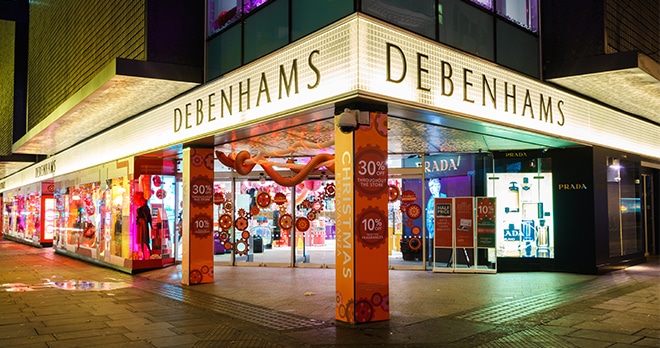What’s in a deal? Debenhams acquisition explained

The deal marks a changing of the guard in UK retail prompted by a radical acceleration towards online shopping during the pandemic. The deal is not new or unique; but it is prominent and signals what’s to come for the sector
What happened?
Debenhams, the world’s oldest department store, entered administration last year. It had been hoped that the administrators would be able to find a buyer and sell on the business as a going concern. JD Sports came close but pulled out of any purchase after seeing a sharp fall in its share price. If a buyer had been found there may well have been redundancies as buyers normally only take on a business they think they can make more efficient. However, that buyer may well have kept on many of the staff who will now unfortunately all be made redundant later in the year.
Tim Gofton, Employment Senior Associate commented, “The permanent closure of Debenhams’ remaining 124 stores will leave enormous gaps on high streets around the country and the loss of thousands of steady jobs, the majority of which were held by women. The Government needs a recovery plan to help get the retail sector back on its feet”.
What does Boohoo get for its money?
Assets not staff
What Boohoo has done is ‘cherry pick’ specific assets of the Debenhams’ business now it has gone into administration. The main assets it has acquired are the database of clients, the brand and the online infrastructure. By buying the assets out of administration, Boohoo has avoided inheriting staff. It may be seen as a ruthless move, but it does mean that it doesn’t take on the legal liabilities for a large number of shop floor and other staff and importantly the costs that go with employing those staff (notice pay, pension obligations, redundancy pay and salaries etc). In a rapidly changing retail environment, where more emphasis is being placed on online sales and automation in warehouses, Boohoo hopes that by not taking on the Debenhams staff it has given itself a competitive advantage. Unfortunately for the Debenhams staff it may be right.
IP and goodwill
Debenhams was an iconic brand, a staple for household goods, beauty brands and clothing, and a reassuring store that consumers valued separately to the goods it sold. This has taken hundreds of years to build up.
The value of any brand is its intellectual property and the goodwill of the business.
Registered IP rights are easy to map out. What trademarks does a company own that are registered in the UK and worldwide? The owner of a trade mark has the exclusive right to use the name. Much like another well-known name, Karen Millen, Debenhams will now be a Boohoo brand.
But what of goodwill? This intangible right might be defined as the reputation of the business based on factors such as length of years trading, turnover and consumer recognition.
It is that consumer confidence in the brand that Boohoo has instantly acquired that Debenhams had built up over 243 years. Traditional shoppers probably don’t know Boohoo, but they do know and trust Debenhams.
Stephen Welfare, IP Partner and brand expert commented, “Despite its stagnating and ageing stores and initial slow move to online, Debenhams’ online business was taking around £400m a year from 300 million visitors, making it one of the top retail websites in the UK. Boohoo’s acquisition of the Debenhams website will help it appeal to older shoppers and give them access to new markets including beauty, homewares and sportswear”
Wider implications for the retail sector
It is clear that despite Debenhams’ prime geographic location in many towns and cities across the UK, the sale to online fashion retailer, Boohoo, reflects the fact that, today, the value of many big name retailers is increasingly viewed in relation to the competitiveness and effectiveness of their online businesses, brands and capture of customer data. Having a strong real estate portfolio is increasingly seen as a negative to the business proposition and a drag on profitability.
Why is this significant? Well, it will further impact those real estate investment funds and investors (including many pension funds) who are heavily weighted towards the retail sector and push them towards repurposing part of their portfolios to residential, logistics and other sectors which are more robust.
David Paxton, Real Estate Partner and repurposing expert added, “It is becoming increasingly difficult to value retail assets using the RICS Red Book. Online retail is still rapidly evolving and traditional retailers are having to adapt to remain relevant (and therefore solvent) in meeting changing customer demand and shopping habits. Further, this is occurring in an increasingly dynamic and uncertain operating environment with global supply chains”.